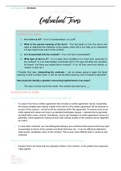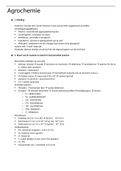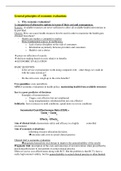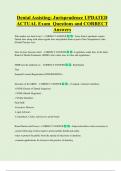CONTRACT LAW: REVISION
STRUCTURE FOR APPROACHING A PROBLEM QUESTION CONCERNING
CONTRACTUAL TERMS:
1. Is it a term at all? - Or is it a representation, or a puff?
2. What is the precise meaning of the term? - This test leads on from the above and
helps to determine the intentions of the parties, which will in turn help us to understand
if it was meant to be a term of the contract.
3. Is it incorporated into the contract? - If so, how has it incorporated?
4. What type of term is it? - Is it a major term (condition) or a minor term (warranty) of
the contract? Is it an intermediate/ innominate term? The type will affect the remedies
for breach. Are there any implied terms involved? - If so, do they come from statute, or
custom, or fact, etc.?
! Possible final step: interpreting the contracts – are we always going to apply the literal
meaning of what is written down, or will we use the literal meaning, even if it leads to absurdity?
How would we identify a question concerning implied terms in an exam?
- The clue is to look out for the words: “the contract was silent as to __.”
INTRODUCTION TO TERMS:
How do we decide what the terms of a contract actually are?
- It is easy if we have a written agreement that includes an entire agreement clause. Essentially,
this clause dictates that nothing outside of the terms of the written agreement will be deemed to
be part of the contract – all terms will be contained within the agreement. Provisions such as an
entire agreement clause are known as standard boilerplate clauses – standard terms generally
included within every contract. Sometimes, courts can disregard an entire agreement clause but
generally, entire agreement clauses ensure that nothing outside of the contract can be regarded
as a term.
- In most other contracts, we must distinguish between pre-contractual discussions that have been
incorporated as terms of the contract and those that have not – it can be difficult to determine
what exactly constitutes a term of the contract. This is even more difficult when it comes to oral
contracts.
Then, we have this distinction between express terms and implied terms.
- Express terms are those that are expressly written in the contract, or the parties have expressly
orally agreed.
TITLE
SUB-TITLES
REQUIREMENTS
SUB-REQUIREMENTS
OTHER TITLES
,CONTRACT LAW: REVISION
- However, at times, the courts may take it upon themselves to imply terms into a contract. For
some implied terms, we know exactly what they are, because they are included in statute, e.g.
CRA 2015: the requirement that goods have to be fit for purpose is an implied term and you
cannot contract out of it – this only applies to business-to-consumer contracts. For business-to-
business contracts, the implied terms that one cannot contract out of found in statute are
contained within the Sale of Goods Act 1979. As well as statutorily implied terms, there are
also terms implied by the courts. These are much more difficult to determine as terms,
because the judge essentially decides that a term has to be implied in order to make the contract
work.
Within the world of statements, there is a hierarchy.
- At the top of this hierarchy are terms of the contract itself. Below this: mere representations,
which have no actionability unless they are misrepresentations; puffs, which have no actionability
– so, how do we decide if something is a term, mere representation or a mere puff?
Below is the chart of the hierarchy of statements:
1. Written contracts - if there is an entire agreement clause, everything within that written contract
will be a term. If there is a partly oral contract, oral statements can be terms too. Within this world
of terms, there is a further hierarchy. There are three different types of terms that it may be:
! The highest form: conditions. These are the most important, major terms of the contract, e.g.
price, description of goods. If someone breaches such a major term of the contract, the innocent
party (victim of breach) has the right to both end/ terminate the contract and claim money damages.
Termination (stopping the agreement/ contract where it lies) for breach of a condition is different from
rescission for misrepresentation (bringing parties back to where they would have been if it did not
occur).
TITLE
SUB-TITLES
REQUIREMENTS
SUB-REQUIREMENTS
OTHER TITLES
, CONTRACT LAW: REVISION
! The lowest form: warranties. In the context of contractual terms, this is the lowest form of
contractual promises. For example, a choice of jurisdiction (e.g. if litigation ensues, we will go to the
courts of England and Wales) clause is a warranty, not a condition. If you breach a warranty, there’s
no right to terminate the contract by the innocent party. You only have the right to money damages.
! Most terms will fall into the categories mentioned above. However, a minute amount of terms will
fall into the category of innominate/ intermediate terms – we cannot tell whether they are a major
or minor term of the contract simply by looking at them. The remedy for the breach of these terms will
depend on the circumstances – we have to see what the effect of the breach is to decide whether it
is possible to terminate the contract or not (nonetheless, you will always have rights to damages).
For example, seaworthiness may be an innominate term. A ship may be unseaworthy, because it
lacks a fundamental aspect of seaworthiness and thus, will be treat like a breach of a condition.
However, it might be unseaworthy in a very minor way, so it would be treated as a breach of a
warranty.
2. Then, there are puffs and representations. There may also be a misrepresentation, which is
actionable and can give rise to common law remedies – the same statement cannot be both a
term of the contract and a misrepresentation. You have to choose one or the other as a method
of finding liability. It is often more preferable to pursue the misrepresentation claim, rather than
the terms claim, if the term is a warranty – if you pursue the misrepresentation claim, you will
have the remedy of rescission and damages, as opposed to solely damages.
! Essentially, if written down, it will almost always be a term. If it is discussed orally, it can be a term, puff
or representation.
3. If a statement is not a term of the main contract, one approach courts may take sometimes is to
enforce it as a collateral/ side contract – essentially, agreements made outside of a contract
can be enforced as side agreements. The problem with enforcing written and oral agreements as
collateral contracts is that all other formation elements must be present.
STRUCTURE FOR DEALING WITH CONTRACTUAL TERMS:
1. EXPRESS TERMS
A. REPRESENTATIONS VS. TERMS:
When we’re determining whether something is a misrepresentation or a term, we have to apply
the objective test. This is: what would a reasonable person think in the circumstances? Would a
reasonably objective person think this statement is intended to be part of the contract, or
intended to be a representation about the contract?
Heilbut, Symons & Co v Buckleton [1913] case gave us four principles (not truly a test) for us
to think about when a reasonable person is determining whether something is a term or a
representation:
1. Timing – the court will consider the lapse of time between making the statement and the
conclusion of the contract. The closer the statement is to the conclusion of the contract, the more
likely it is that the statement will form part of the contract and be a term. The further away the
time, the more likely it is that it will be a representation, rather than a term.
TITLE
SUB-TITLES
REQUIREMENTS
SUB-REQUIREMENTS
OTHER TITLES
STRUCTURE FOR APPROACHING A PROBLEM QUESTION CONCERNING
CONTRACTUAL TERMS:
1. Is it a term at all? - Or is it a representation, or a puff?
2. What is the precise meaning of the term? - This test leads on from the above and
helps to determine the intentions of the parties, which will in turn help us to understand
if it was meant to be a term of the contract.
3. Is it incorporated into the contract? - If so, how has it incorporated?
4. What type of term is it? - Is it a major term (condition) or a minor term (warranty) of
the contract? Is it an intermediate/ innominate term? The type will affect the remedies
for breach. Are there any implied terms involved? - If so, do they come from statute, or
custom, or fact, etc.?
! Possible final step: interpreting the contracts – are we always going to apply the literal
meaning of what is written down, or will we use the literal meaning, even if it leads to absurdity?
How would we identify a question concerning implied terms in an exam?
- The clue is to look out for the words: “the contract was silent as to __.”
INTRODUCTION TO TERMS:
How do we decide what the terms of a contract actually are?
- It is easy if we have a written agreement that includes an entire agreement clause. Essentially,
this clause dictates that nothing outside of the terms of the written agreement will be deemed to
be part of the contract – all terms will be contained within the agreement. Provisions such as an
entire agreement clause are known as standard boilerplate clauses – standard terms generally
included within every contract. Sometimes, courts can disregard an entire agreement clause but
generally, entire agreement clauses ensure that nothing outside of the contract can be regarded
as a term.
- In most other contracts, we must distinguish between pre-contractual discussions that have been
incorporated as terms of the contract and those that have not – it can be difficult to determine
what exactly constitutes a term of the contract. This is even more difficult when it comes to oral
contracts.
Then, we have this distinction between express terms and implied terms.
- Express terms are those that are expressly written in the contract, or the parties have expressly
orally agreed.
TITLE
SUB-TITLES
REQUIREMENTS
SUB-REQUIREMENTS
OTHER TITLES
,CONTRACT LAW: REVISION
- However, at times, the courts may take it upon themselves to imply terms into a contract. For
some implied terms, we know exactly what they are, because they are included in statute, e.g.
CRA 2015: the requirement that goods have to be fit for purpose is an implied term and you
cannot contract out of it – this only applies to business-to-consumer contracts. For business-to-
business contracts, the implied terms that one cannot contract out of found in statute are
contained within the Sale of Goods Act 1979. As well as statutorily implied terms, there are
also terms implied by the courts. These are much more difficult to determine as terms,
because the judge essentially decides that a term has to be implied in order to make the contract
work.
Within the world of statements, there is a hierarchy.
- At the top of this hierarchy are terms of the contract itself. Below this: mere representations,
which have no actionability unless they are misrepresentations; puffs, which have no actionability
– so, how do we decide if something is a term, mere representation or a mere puff?
Below is the chart of the hierarchy of statements:
1. Written contracts - if there is an entire agreement clause, everything within that written contract
will be a term. If there is a partly oral contract, oral statements can be terms too. Within this world
of terms, there is a further hierarchy. There are three different types of terms that it may be:
! The highest form: conditions. These are the most important, major terms of the contract, e.g.
price, description of goods. If someone breaches such a major term of the contract, the innocent
party (victim of breach) has the right to both end/ terminate the contract and claim money damages.
Termination (stopping the agreement/ contract where it lies) for breach of a condition is different from
rescission for misrepresentation (bringing parties back to where they would have been if it did not
occur).
TITLE
SUB-TITLES
REQUIREMENTS
SUB-REQUIREMENTS
OTHER TITLES
, CONTRACT LAW: REVISION
! The lowest form: warranties. In the context of contractual terms, this is the lowest form of
contractual promises. For example, a choice of jurisdiction (e.g. if litigation ensues, we will go to the
courts of England and Wales) clause is a warranty, not a condition. If you breach a warranty, there’s
no right to terminate the contract by the innocent party. You only have the right to money damages.
! Most terms will fall into the categories mentioned above. However, a minute amount of terms will
fall into the category of innominate/ intermediate terms – we cannot tell whether they are a major
or minor term of the contract simply by looking at them. The remedy for the breach of these terms will
depend on the circumstances – we have to see what the effect of the breach is to decide whether it
is possible to terminate the contract or not (nonetheless, you will always have rights to damages).
For example, seaworthiness may be an innominate term. A ship may be unseaworthy, because it
lacks a fundamental aspect of seaworthiness and thus, will be treat like a breach of a condition.
However, it might be unseaworthy in a very minor way, so it would be treated as a breach of a
warranty.
2. Then, there are puffs and representations. There may also be a misrepresentation, which is
actionable and can give rise to common law remedies – the same statement cannot be both a
term of the contract and a misrepresentation. You have to choose one or the other as a method
of finding liability. It is often more preferable to pursue the misrepresentation claim, rather than
the terms claim, if the term is a warranty – if you pursue the misrepresentation claim, you will
have the remedy of rescission and damages, as opposed to solely damages.
! Essentially, if written down, it will almost always be a term. If it is discussed orally, it can be a term, puff
or representation.
3. If a statement is not a term of the main contract, one approach courts may take sometimes is to
enforce it as a collateral/ side contract – essentially, agreements made outside of a contract
can be enforced as side agreements. The problem with enforcing written and oral agreements as
collateral contracts is that all other formation elements must be present.
STRUCTURE FOR DEALING WITH CONTRACTUAL TERMS:
1. EXPRESS TERMS
A. REPRESENTATIONS VS. TERMS:
When we’re determining whether something is a misrepresentation or a term, we have to apply
the objective test. This is: what would a reasonable person think in the circumstances? Would a
reasonably objective person think this statement is intended to be part of the contract, or
intended to be a representation about the contract?
Heilbut, Symons & Co v Buckleton [1913] case gave us four principles (not truly a test) for us
to think about when a reasonable person is determining whether something is a term or a
representation:
1. Timing – the court will consider the lapse of time between making the statement and the
conclusion of the contract. The closer the statement is to the conclusion of the contract, the more
likely it is that the statement will form part of the contract and be a term. The further away the
time, the more likely it is that it will be a representation, rather than a term.
TITLE
SUB-TITLES
REQUIREMENTS
SUB-REQUIREMENTS
OTHER TITLES








